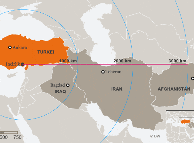In Septermber will be a citizen's referendum in Turkey regarding consitutional amandments in the judiciary. Then, somewhere between September 2010 and July 2011 will be general elections.
The date is dependent on outcome of referendum.
This thread will cover the road to election.
The date is dependent on outcome of referendum.
This thread will cover the road to election.


